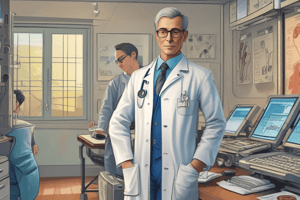Podcast
Questions and Answers
Which of the following is true regarding a person's medical history and current medications?
Which of the following is true regarding a person's medical history and current medications?
- Knowing a person's medical history has no impact on the seriousness of an injury.
- Knowing a person's medical history can help determine the seriousness of an injury. (correct)
- Knowing a person's medical history can worsen the seriousness of an injury.
- Knowing a person's medical history is irrelevant in determining the seriousness of an injury.
Why is it important to ask good questions and carefully listen to the patient's answers?
Why is it important to ask good questions and carefully listen to the patient's answers?
- To pass the time while waiting for medical assistance.
- To make the patient feel more comfortable.
- To avoid asking unnecessary questions.
- To gather clues about other concerns that should be pursued. (correct)
What is the purpose of recording sets of vital signs in a backcountry setting?
What is the purpose of recording sets of vital signs in a backcountry setting?
- To avoid asking unnecessary questions.
- To evaluate whether the patient's condition is improving or deteriorating. (correct)
- To make the patient feel more comfortable.
- To pass the time while waiting for medical assistance.
Why is it important to know if a patient is getting better, worse, or remaining stable in a backcountry setting?
Why is it important to know if a patient is getting better, worse, or remaining stable in a backcountry setting?
How can a person's response to a medical situation vary?
How can a person's response to a medical situation vary?
Which of the following is a potential consequence of not identifying a person's previous medical history or current medications?
Which of the following is a potential consequence of not identifying a person's previous medical history or current medications?
Why is it important for responders to ask good questions and carefully listen to the patient's answers?
Why is it important for responders to ask good questions and carefully listen to the patient's answers?
Which of the following is an example of a potential change in a patient's condition that can be evaluated by recording sets of vital signs?
Which of the following is an example of a potential change in a patient's condition that can be evaluated by recording sets of vital signs?
Why is it important to know if a patient is on blood thinners and suspects a potential internal bleed?
Why is it important to know if a patient is on blood thinners and suspects a potential internal bleed?
Why is it vital to know if a patient is getting better, worse, or remaining stable in a backcountry setting?
Why is it vital to know if a patient is getting better, worse, or remaining stable in a backcountry setting?
Identifying facts regarding a person’s previous ______ history or indeed current medications, may actually increase the seriousness of an otherwise simple injury and require a more rapid response
Identifying facts regarding a person’s previous ______ history or indeed current medications, may actually increase the seriousness of an otherwise simple injury and require a more rapid response
For example, someone who is on ______ and whom we suspect has a potential internal bleed, may decompensate much faster than a person not on that medication
For example, someone who is on ______ and whom we suspect has a potential internal bleed, may decompensate much faster than a person not on that medication
These ______ may not be immediately obvious or volunteered by the patient
These ______ may not be immediately obvious or volunteered by the patient
The ______ responder will have to become a detective, asking good questions and carefully listening for answers that provide clues as to other concerns that should be pursued
The ______ responder will have to become a detective, asking good questions and carefully listening for answers that provide clues as to other concerns that should be pursued
As we have the patient in our care for an extended period in a backcountry setting, it is vital that we know if they are getting better, worse or remaining ______
As we have the patient in our care for an extended period in a backcountry setting, it is vital that we know if they are getting better, worse or remaining ______
Flashcards are hidden until you start studying




